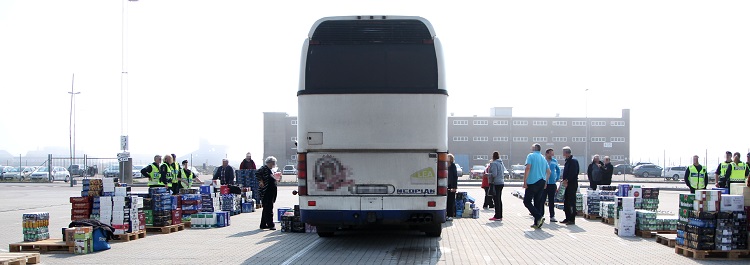
Alcohol smuggling
Alcohol smuggled into Sweden is often linked to organised crime. One of our tasks is to seize alcohol smuggled across the Swedish border.
Who profits from smuggled alcohol?
Whether you buy from an old acquaintance or someone you just got a phone number from, you are helping to feed the black economy in society. A few years ago, Swedish Customs estimated that alcohol smuggling via organised bus journeys alone generated crime profits of SEK 300 million a year. The tax loss was just as high, i.e., another SEK 300 million per year.
This is money that would otherwise have gone to society. To your and your family’s education, health and welfare.
But it doesn't stop there. Alcohol smuggling is often organised, and the profits from crime feed other crime. Money that can be reinvested in everything from drug trafficking to human smuggling. What may seem harmless – surely one bottle won't hurt anyone? – can thus be an enabler of much dirtier and more sinister activities.
Young people are good customers
When alcohol is sold to young people, the profit is much higher than when it is sold to adults, because young people cannot buy legally at Systembolaget, the Swedish Alcohol Monopoly. This makes young people a lucrative clientele.
Sales are made through the channels that young people themselves use, such as social media. That attractive bottle for the party may be just a click away.
Multi-level sales
A friend's brother selling to a teenager is probably not the one who smuggled the alcohol into Sweden. The sale often takes place in several stages.
Lines that have a common interest – to continue making illicit money. And where there is illicit money to be made, there are also threats and violence present. Because a lot is at stake. Because the money is needed to pay debts. Or as a stake in other criminal schemes. Or just to maintain a lifestyle and consumption far beyond what one could otherwise afford.
Smuggling is organised
Over the years, smuggling of alcohol into Sweden has become well organised. And it also tends to change shape.
Take, for example, the so-called ‘booze buses’. Since 2016 and 2017, Swedish Customs and several other authorities have been working hard to combat organised bus trips where passengers were paid to declare that the alcohol on the buses was for private consumption – and this smuggling has declined significantly.
On paper, it also looks like smuggling has decreased since then. In 2018, Swedish Customs seized or confiscated around 484,000 litres of alcohol, down from the previous year.
However, it’s not that simple. Smuggling continues, albeit in a partly different form. Booze buses are fewer, but at the same time Swedish Customs is seeing an increase in what we call ‘ant trafficking’. This means that organised networks of individuals arrive in cars and vans with quantities of alcohol that are carefully measured so as not to arouse suspicion should they be stopped by customs. And where the whole business idea is based on repetition. They make exactly the same trip tomorrow, the day after tomorrow, and the day after that.
Day in and day out. To make money. Selling in several stages. To customers all over the country. Via an anonymous phone number. Or through a friend’s older brother.

Why do Swedish Customs provide this information?
In 2017, Swedish Customs were commissioned by the Swedish government, together with the Swedish Prosecution Authority, the Swedish Police Authority, the Swedish Tax Agency and the County Administrative Boards, to spread knowledge about the link between alcohol smuggling and organised crime. Swedish Customs have chosen to continue working on this matter.
In this way, we hope to reduce the demand for smuggled alcohol. Because if there is no demand, there is no incentive to smuggle. And we all have a shared responsibility in this respect.
Follow us
Follow us on social media to see how we are working to prevent alcohol smuggling and other types of crime.
Last updated:
